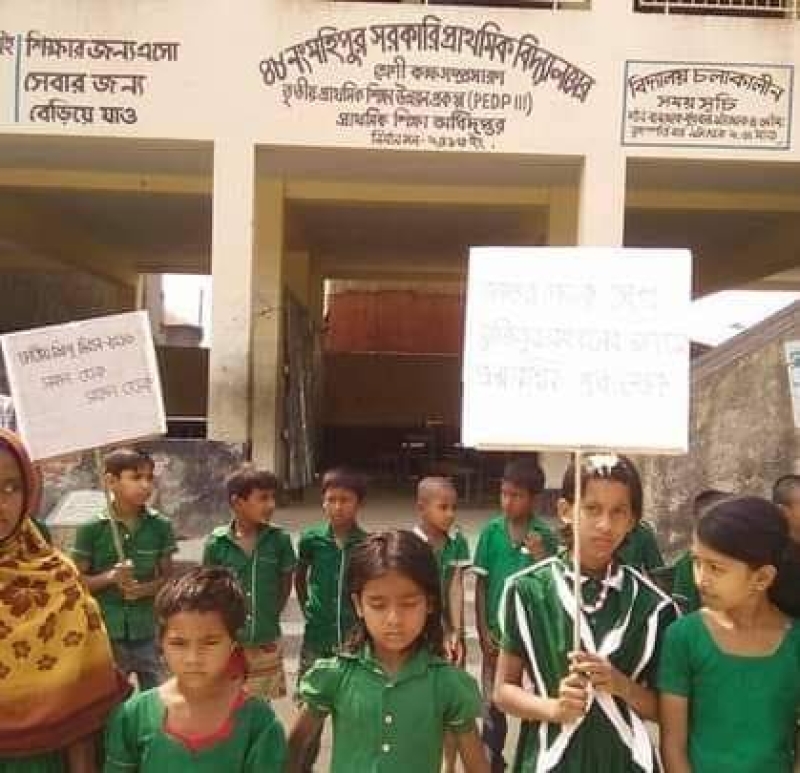- BSF halts fencing at Joypurhat border after BGB intervention |
- 30 NCP leaders urge Nahid Islam not to form alliance with Jamaat |
- Tarique offers fateha at graves of Pilkhana martyrs, father-in-law |
- Navy detains 11 over smuggling diesel, cement to Myanmar |
- Investors stay away as stocks turnover drops 7% despite index gains |
Govt primary schools in Feni in crisis for student shortage
Shift to private institutions

Primary school children protest private tuition business in Kalapara.
Feni, May 15 – Government primary schools in Feni are facing a serious student enrolment crisis, even after various initiatives taken to bring children back to classrooms.
Teachers and education officials point to the growing attraction of kindergartens and madrasas as a major reason behind the falling numbers in public schools.
Many parents say they believe private institutions provide better quality education compared to government-run schools, especially in terms of discipline and religious instruction.
According to data from the six upazila primary education offices, 180 out of 534 government primary schools in Feni now have fewer than 100 students.
Among them, 12 schools have less than 50 students enrolled.
Each school has three to 12 teachers, yet parents continue to express concern over the standard of teaching.
Visits to these schools have revealed poor attendance and lack of classroom engagement.
This year, the district education office recorded 171,946 enrolments in government primary schools—11,624 fewer than in 2024.
A serious concern has also emerged due to a mismatch in data between the district and upazila offices.
While the district reports over 171,000 students, the upazila offices together count only 72,795—almost 100,000 less.
District officials claim that 97.48% of children aged five to 10 are currently enrolled in government schools.
But ground-level reports tell a different story.
Several local schools are reporting very low student numbers. Nilkhi Balika Government Primary School in Fulgazi has only 32 students. Devi Pur Ferdous Akhtar School has just 23.
Many parents say the absence of religious studies in government schools and what they describe as inattentive teachers, have led them to seek alternatives.
Monowara Begum from Rampur said she admitted her daughter to a private school. “The nearby government school doesn’t offer religious studies, and the teachers aren’t attentive,” she said.
Jibon Chandra Das, headteacher of Devi Pur Ferdous Akhtar School, said, “We have only three teachers, and most parents are choosing madrasas or kindergartens over us.”
Mohid Uddin Khondaker, Secretary General of the Primary Teachers’ Association, said, “Uncontrolled rise of kindergartens and madrasas, mismatch between textbooks and religious beliefs, and shortage of religious instructors are the key reasons why parents are pulling their children out. Teachers also feel less motivated when classrooms are empty.”
SM Taherul Islam, education officer of Sonagazi Upazila, said many coastal families prefer work and religious education to formal schooling.
He added that teachers are now going door-to-door in many areas to encourage enrolment.
Md Shahadat Hossain, General Secretary of Shushashoner Jonno Nagorik (Sujan), Feni, said, “Parents want quality education. Even those with limited means often choose private schools over nearby government ones.”
District Primary Education Officer Firoz Ahmed pointed to post-COVID changes and the closure of local maktabs, which he said have led many families to turn to madrasas.
On the conflicting enrolment data, he explained that district figures are used mainly for estimating the number of books required each year.
Additional Deputy Commissioner (Education & ICT) Fatema Sultana called the situation “alarming” and said steps will be taken in coordination with the district education office.
The 2010 National Education Policy recommends one teacher for every 30 students.
A CPD survey says the national average is currently 1:29. Still, many schools in Feni with far fewer students remain without enough trained or motivated teachers.
Although the government has implemented measures like stipends, free textbooks, mid-day meals, and school infrastructure development, enrolment in public primary schools in Feni continues to fall.
The government has warned that schools with fewer than 50 students may be merged with nearby ones—highlighting the urgent need for action. - UNB

